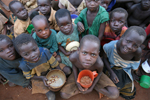
This week, the World Bank’s Social Development Department hosted a conference titled, “Violence Prevention: A Critical Dimension of Development.” This two-day event sought to foster a greater understanding of how “violence has become one of the most salient development issues in the global agenda” and “how the World Bank can move forward in addressing crime and violence.”
Off-setting panels that featured economists, statisticians, and analysts, the World Bank dedicated an entire session to highlighting a vital, yet often overlooked, perspective: children who survived war. This panel featured testimonies, insights, and recommendations from four survivors: Grace Akallo and Dominic Akena, both former LRA child soldiers from northern Uganda; Zlata Filipovic, author and survivor of the Bosnia-Herzegovina war; and John Kon Kelei, former SPLA child soldier from southern Sudan.
As summarized by moderator Ozong Agborsangaya-Fiteu, four important themes emerged from the discussion:
- The resiliency of the human spirit
- The important role of education in reintegration and reconstruction efforts of conflict and post-conflict settings
- The misconception that only boys are child soldiers and the resulting marginalization of girl soldiers returning from war
- The absence of social systems to provide to support to children affected by conflict
While these are all relevant and important themes to remember when undertaking development or humanitarian endeavors in countries affected by conflict, for me the discussion’s most insightful lesson came from Grace and Zlata. The majority of the people in situations of violence and conflict have no voice. “You give them food and ‘that’s enough.’ That’s not enough,” said Grace. They need dignity. They need an outlet to voice their concerns and their stories. Zlata commended the World Bank for including first-person perspectives in the event, seeing it as a complement to the charts and graphs often associated with the field of international development.
I certainly agree. Listening to the testimonies reminded me why I, like so many in this field, chose to advocate against these gravest of crimes against humanity. Most importantly, however, the panel reminded me of the importance of continuing to listen to the needs and experiences of people directly affected by conflict. If these are the people we are representing, their voices mustn’t be omitted from conversations on sustainable peace and development.

